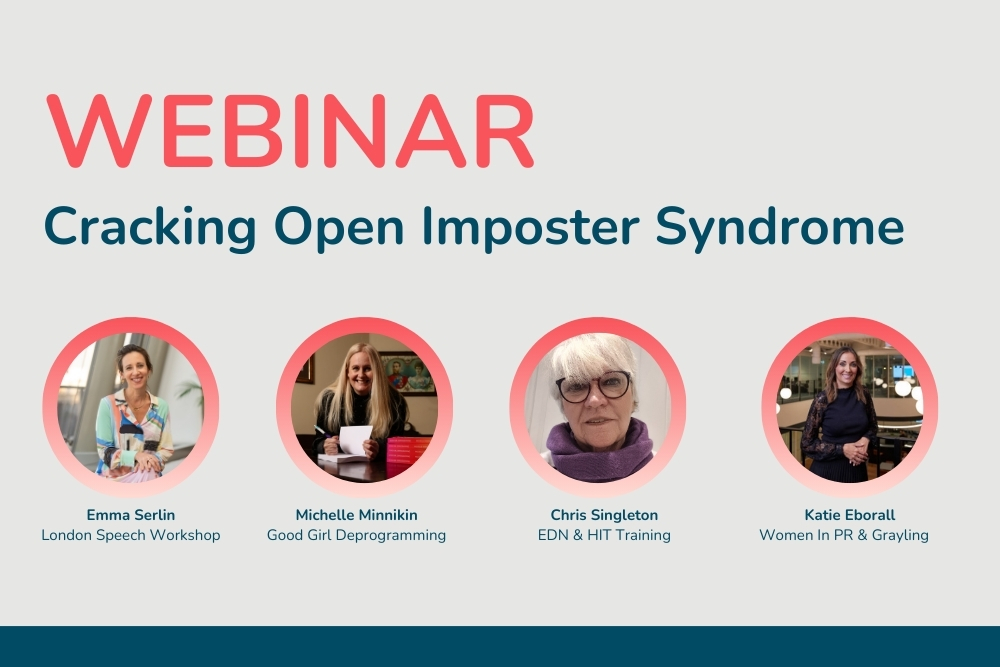What if imposter syndrome isn’t actually a ‘you’ problem?
That provocative question sat at the heart of our most recent webinar, Cracking Open Imposter Syndrome – a bold and beautiful exploration of the hidden force that holds so many talented people back.
Hosted by Emma Serlin, Founder and CEO of London Speech Workshop, the session brought together a powerhouse panel of speakers who brought clarity, vulnerability, and wisdom to this very human experience:
Michelle Minnikin – Chartered Psychologist & Founder of Good Girl Deprogramming.
Chris Singleton – Lead Trainer at EDN Training.
Katie Eberall – Board Member at Women in PR and Communications Director at Grayling.
Together, they created an unforgettable conversation that not only named the inner critic, but offered real, tangible ways to challenge it – and reclaim confidence from the inside out.
The Conversation in More Detail…
Emma set the tone with warmth and openness, sharing her own experience with imposter syndrome, and inviting the audience into a safe space of curiosity and shared insight.
“Imposter syndrome thrives in silence. What today showed me is that when we speak it out loud, when we get curious instead of critical, we start to take back our power. That’s when real confidence begins.” – Emma Serlin
Chris Singleton grounded us in the data, sharing results from a 5,000-person survey conducted by EDN that revealed the scope of the issue.
“Almost half of people we surveyed had experienced imposter syndrome – 54% of women and 38% of men. Among younger generations, the numbers rose even higher – 66% of Gen Z. The less supported or represented people feel, the more likely they are to experience it.” – Chris Singleton
Michelle Minnikin flipped the script, offering a radical reframe: imposter syndrome isn’t a personal flaw, it’s a natural response to systems that weren’t built for us.
“Toxic and exclusionary environments are what cause us to feel like we don’t belong. We internalise it because we’re trying to survive in a world not designed for us. But it’s not our fault.” – Michelle Minnikin
Katie Eberall offered insight into how imposter syndrome shows up in industries like PR, where women are overrepresented in junior roles but underrepresented at the top.
“I experience imposter syndrome on a day-to-day basis. It shows up when I’m leading a big pitch or when a senior male colleague undermines me. Even prepping for this panel, I asked myself ‘Am I enough to be here?’” – Katie Eberall
When It Gets Personal
From there, the conversation moved into real-life experiences. Moments where imposter syndrome crept in and how each speaker dealt with it.
Katie shared her early university experience, where she felt out of place surrounded by people from more privileged backgrounds.
Michelle spoke candidly about publishing her book and fearing the judgement of “proper psychologists.”
Chris admitted her closest brush with imposter syndrome came during postgraduate studies but instead of fear, she saw it as a humbling reality check.
Emma offered her own story. Once terrified of public speaking while leading a communication company. The breakthrough came when she reconnected to her authenticity: “I realised I didn’t have to be anyone else. I just had to say what mattered, in my own voice.”
Tools That Actually Help
But this wasn’t just about sharing the struggle. It was about offering tools to move through it. Here are some standout strategies from the webinar:
Reframe the Inner Critic
Instead of battling that voice, understand its intention. It’s trying to keep you safe. Acknowledge it, and gently say: “Thanks, I’ve got this.”
The 5-Second Rule (from Mel Robbins)
Feel the fear, count down 5-4-3-2-1… and act. Confidence grows with action.
Borrow Someone Else’s Thoughts
When your brain won’t help you, borrow a mentor, coach or friend’s voice of reason.
Claim Your Space
Use body language, vocal authority and intention to take up space, even when you don’t feel sure. (At LSW, we call this vocal gravity.)
Create Safe Environments
If you’re in leadership, model vulnerability and openness. Talk about your own imposter moments. It creates psychological safety for others.
Keep a Brag Book
Track your wins, achievements, and moments of courage. When doubt creeps in, remind yourself of your growth.
Discover Your Secret Sauce
At LSW, we guide clients to uncover their unique strengths, values, and communication magic. Knowing your value helps quiet the noise of imposter thoughts.
Thank You for Joining Us
To everyone who joined us live, thank you! Your questions, your honesty, and your curiosity made this conversation rich and memorable. If you couldn’t make it, the replay will be in your inbox (and on our socials) very soon. Keep your eyes peeled!
Ready to Take This Further?
If this conversation stirred something in you and you’d like to explore one on one communication coaching, why not Book a free 15-minute Discovery Call with one of our team and see how we could support your communication journey.
For team training, you can book a Consultation call in with our B2B team here.
And make sure to connect with our speakers to keep the conversation going:
- Connect with Emma Serlin on LinkedIn and learn more about London Speech Workshop
- Connect with Michelle Minnikin and explore Good Girl Deprogramming
- Connect with Chris Singleton and discover EDN Training
- Connect with Katie Eberall and learn more about Women in PR

Start Your Communication Transformation Today
Book a free discovery call to find out how our courses and method can work for you!




